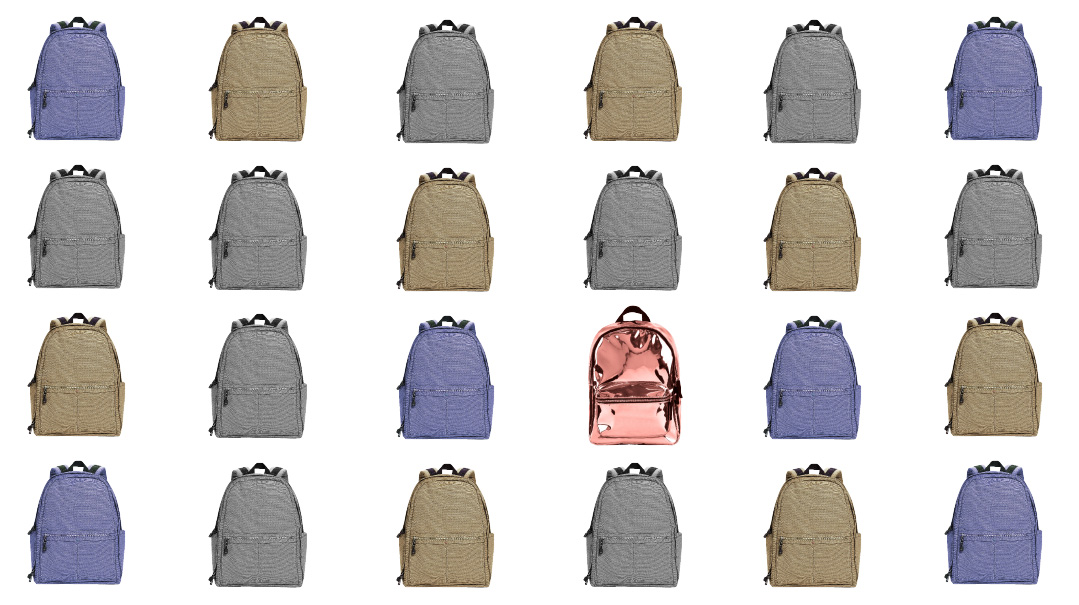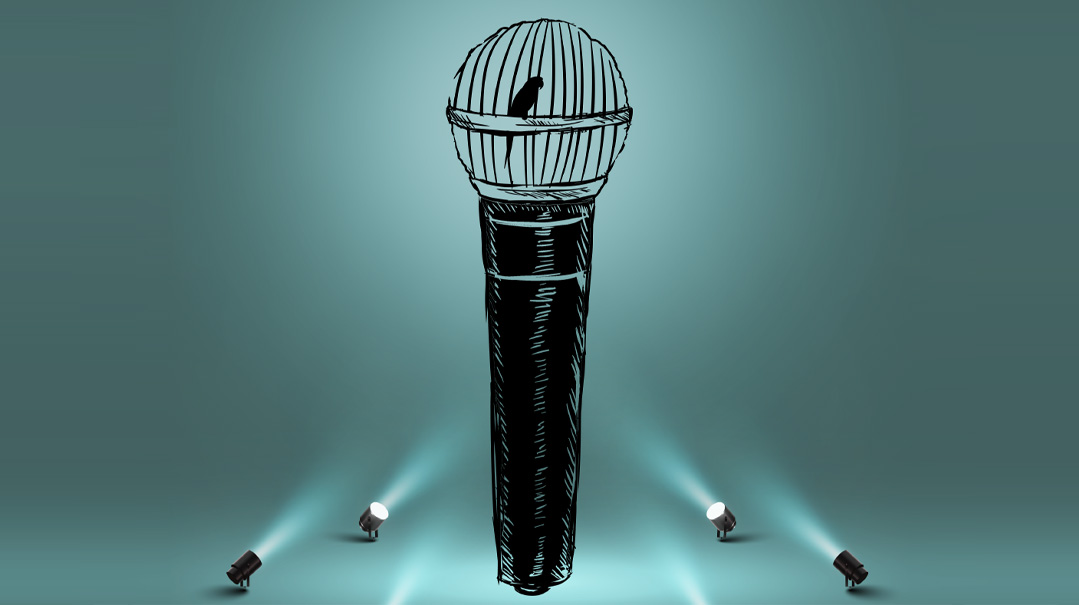Design Misaligned
| June 28, 2022I wanted to give Tzippy the best chances of enjoying her summer — especially since we were spending a fortune to give it to her

Miriam: How can you ruin my daughter’s fresh start over rules you never mentioned?
Fraidy: We have a responsibility to all our campers, but the one who stood to lose most was your daughter.
Miriam
WElove living out of town.
We love the space, the close-knit community, the feeling that we matter.
We don’t mind the fact that there’s only one pizza store or that we can only shop for clothing when we travel to larger communities to visit family.
I love the schools, too, the fact that the teachers know every student personally, that the small size makes it easier for every kid to have a chance to shine.
There’s a definite downside to that, though. When a child struggles to fit in, there’s nowhere else to go.
"T
zippy’s having such a hard time in school,” I confided in my sister Batya, over the phone one evening. “Her class is going through some rough seventh grade politics, her best friend dropped her, you know how it is… and with only 11 girls in the class, she’s really struggling to find her place socially.”
“That’s really tough,” Batya said. “You’d think a small class would make life easier, everyone knows each other, everyone’s friends. But if she’s kind of lost her old chevreh, there’s so little scope to make a new one.”
“Exactly.” I sighed. Poor Tzippy. I wished there was something I could do for her. “I spoke to her teachers, they’re talking to the class about inclusion and middos and everything, but it’s not as if she’s being excluded or bullied. Just that she’s been — lonely. Not having close friends is really painful.”
“Right, for sure,” Batya said. She paused for moment and then continued, sounding all excited. “Miriam, you should really send her to sleepaway camp! Give her a chance to get to know a whole new social circle, girls from other places… she’d love it.”
“Camp?” I wasn’t expecting to hear that. “But it costs a fortune,” I said lamely. We’d never considered sleepaway camp before. It was simply too expensive to fit into our budget.
“I think maybe you should consider it for Tzippy this year,” Batya urged. “My girls love it, and when Esti was having a hard time socially, camp was literally her lifeline. She had camp friends, and it made all the difference until she made a good group of friends in school too.”
Batya has always had strong powers of persuasion. I mulled over the idea. Maybe it would be the right step for Tzippy. A fresh start, an opportunity to get to know hundreds of girls from all over… maybe it would be just what she needed.
“I’ll discuss it with Shmuel, but you know what, Bats? I think you’re onto a good thing here,” I said.
T
he more I thought about the idea, the more I liked it. And while Shmuel was reluctant — where would we get the money? — eventually he came on board as well. We both agreed that while a summer in camp was expensive, it wasn’t too high a price for something that would hopefully save our daughter’s flagging self-esteem, inject vibrancy into her lackadaisical social life, and allow her a rejuvenating break from a difficult year. We also hoped that after a successful summer, she’d come back to school with renewed confidence and have an easier time next year.
The next hurdle was finding a camp that would be a good fit for our hashkafos, one where Tzippy would have a good chance of fitting in with the crowd. I loved my sister Batya, but she had different standards, and the camp she sent her daughters to was unlikely to work for mine. Instead, I reached out to my cousin Raizy. She’d sent several daughters to camp in the past, and I knew I could trust her recommendation.
She enthusiastically recommended Camp Penina, and mentioned that two of her own girls would be counselors there. I was excited to hear that — it would be amazing for Tzippy to have some familiar faces, people to look out for her — but even so, I continued my research. A few other camp names came up, and I investigated them all rigorously. In the end though, I agreed that Raizy’s choice sounded best. We filled out an application, sent the deposit, and I took up Raizy’s offer to put in a good word for us with Mrs. Frankel, the camp director. Living out of town, with no other pull to speak of, I figured the personal recommendation couldn’t hurt.
W
hen Tzippy was accepted to Camp Penina, I breathed a sigh of relief — prematurely. If I’d thought the hard part was over, I soon learned that the real challenge was just beginning: camp shopping.
I wanted to give Tzippy the best chances of enjoying her summer — especially since we were spending a fortune to give it to her. I was determined to make sure she had everything she needed in order to fit in, have an amazing time, and feel like she belonged. My large family and the demands of my job notwithstanding, I devoted hours to Tzippy’s camp shopping list, researching and networking and shopping and ordering and returning and shopping again.
The list itself was frustratingly vague, and I made many frantic phone calls to my cousin Raizy for advice. I had questions on almost every line: When the camp wrote “shower caddy,” did that mean the mesh folding ones or the hard plastic? How much nosh did girls bring? What kind of slippers worked for Shabbos afternoons? I knew that the crowd at Camp Penina was more “out of town,” but I also knew how much value teens placed on “stuff,” and I wanted to set Tzippy up for success. I was determined to make sure she had the right stuff, that she’d feel like she fit in and be able to connect with the other girls easily.
I asked Raizy everything I could think of, and procured numbers of other veteran Camp Penina mothers so I could get even more information. I checked every detail: whether laundry bags should be personalized, how nosh should be stored, which hair irons wouldn’t blow fuses, which shampoos worked well with the camp water… And then it was back to shopping, packing, ordering, and shopping some more.
I made sure to spend time talking to Tzippy about what being away from home might feel like, about navigating a brand-new social scene, everything important that she needed to know. She was a little nervous, but even more excited. And I was delighted that we could offer her this opportunity, especially after the rough year she’d been through.
When she was finally off, I felt like I’d scaled a mountain. Now all I could do was sit back and daven that she’d have a great summer. I’d done whatever I could; the results were not in my hands.
MY
relief was short-lived. It only lasted a week, in fact.
Then we got a phone call from Mrs. Frankel herself.
“This is Fraidy Frankel, the camp director,” she said, introducing herself crisply. “Not to worry — there’s nothing wrong with Tzippy. I’m calling about her bag. The one she brought to use on off-ground trips.”
Her bag?
I tried to remember what it looked like. Was it normal for the camp administrator to call a parent about a bag?
“The bag that Tzippy brought has writing on it. A designer brand,” Mrs. Frankel said. That’s when I remembered the bag that we’d spent a few days debating over: It was a classy knapsack with a small logo and brand. Nothing flashy. That was the problem?
I stammered something incoherent, but Mrs. Frankel continued anyway. “It’s not just the bag, actually, a few of her things have similar problems. I just wanted to let you know that the following items have been confiscated, so you can send her new ones that are more suitable to use in our camp.” She listed several small items. Flustered, I grabbed a pen and scribbled the list on the back of a receipt. Knapsack, shower bag, hairbrush — hairbrush? Wait, what was Tzippy using?! — and more.
With a rush of indignation, my voice returned. “Mrs. Frankel,” I asked, trying to keep my tone even. “I read the camp policies and shopping lists extremely thoroughly. I don’t remember seeing anything about writing on products other than clothing. Was this written there?”
Mrs. Frankel made a tut sound. “Look, let me be honest with you,” she said. “We generally only take girls from families who have been with us for years. They know the rules, the style, the unwritten culture. We don’t like to write everything out on the list — it makes camp feel very rigid, very extreme — and the girls feel like we’re the police, out to get them. But anyone who’s ever been to our camp before just knows what’s accepted and what isn’t. Certain things, like writing on products and brand names, are simply not done here.”
I honestly felt like I was struck dumb.
“Are you still there?” Mrs. Frankel asked.
I was. I was also completely overwhelmed by the sheer unfairness of it all. Secret, unwritten rules that only those who had attended camp could know? What about the days and nights, the hours and hours and hours of research and questioning and investigating that I’d done… how come no one had told me? Was it that obvious and intuitive to everyone else?
And to think how much money I’d spent on the designer stuff that Tzippy had been so excited to use in camp.
I wanted to cry for her. I wanted to cry for me.
I mustered up every ounce of calm I had left — it wasn’t much — and tried to reason with Mrs. Frankel. “Okay,” I said, mentally calculating how soon I could get to the stores and the costs of overnight shipping to the country. “I’ll get her new stuff and have it sent to camp, but it’s going to take a few days. Can she please use her hairbrush and bags and things just until the package arrives?”
“I’m afraid that won’t be possible,” Mrs. Frankel said. She did sound a little regretful, but it wasn’t enough. Won’t be possible? What was my daughter supposed to do?
“What will Tzippy do until then?” I asked, stupefied.
Mrs. Frankel didn’t seem to have an answer.
I
finally got to speak to Tzippy herself later that evening. She sniffled into the phone, something about so embarrassing and how she was stuck without so many essentials, borrowing from bunkmates and scrambling to make do without the things she needed.
I reassured her that I was going to send her everything she needed, as soon as I could, and that this was just temporary discomfort. But as soon as I put down the phone, I wanted to cry myself. Why? Why do this to her? After all our efforts, after the enormous expense of sending and outfitting her to camp, why did they have to ruin it all because of some unspoken camp-culture rule?
We would her send whatever she needed, but why couldn’t they give her the dignity of keeping her things until then?
A few days later, Tzippy had her package. I’d done my best, but the new supplies weren’t anywhere near as exciting or pretty as the ones we’d splurged on before the summer had begun — I just didn’t have the time to start looking and comparing. Besides, I was so nervous to get it wrong that I chose the plainest, most refined-looking things that I could.
Tzippy thanked me, sounding lackluster, but that could only have been expected.
Things seemed to settle down after that. When I spoke to Tzippy on the phone, she sounded okay. Her bunk was nice, her counselor was cute, the activities were fun… she didn’t mention her confiscated things, or the new ones I’d sent, so I guessed things were going okay on that front.
But if there was a bad taste in my mouth from the whole Mrs. Frankel experience, I was sure it was even worse for Tzippy.
MY
frustration didn’t let up as the weeks went by. Instead, I found myself rehashing the experience over and over, trying to understand, wishing I could have made them see things my way.
How could they have done it? It was an unwritten rule, why deal with it so strictly and risk ruining my daughter’s entire summer? If only they knew how she’d lived for camp for so many months, how she’d waited desperately, counting down the days. How maybe another girl could have taken this is stride, but for Tzippy, sensitive after her difficult year and brand new to the camp, social success was life and death itself. The embarrassment of having her stuff confiscated, the discomfort of having to beg and borrow… the excitement of camp, the freshness, the new start, all down the drain.
All that money, all the hard work we’d put in… all for nothing, because of a rule they hadn’t even bothered writing down.
One thing was for sure: I wouldn’t be recommending Camp Penina to anyone else.
If I could tell Mrs. Frankel one thing, it would be: How can you ruin a girl’s summer because of a rule she wasn’t even aware of?
Fraidy
There’s growth that only happens in camp.
I know this as a camp director and as a high school mechaneches. In a school environment, we try to help girls in the standard ways: inspiring classes, one-on-one conversations, recommending professional services if need be. But in camp, with the singing and the friendships and the fresh country air, without any academic stress and a whole different social scene, girls seem to blossom and grow almost without any input at all. For just two months, it’s the campers and staff in a little bubble removed from the stresses of day-to-day life. If a girl struggles in school, at home, socially, whatever — this is her chance to get away from it all and live on a different planet for a blissful few weeks.
Best of all, with no technology, no phones, no distractions, there’s no choice but to be present. Camp is about being, and often, that simple contented state leads to unexpected growth. I often watch girls who struggled all year come to life in camp, whether it’s making new friends or connecting to tefillah like they never have before.
On the flip side, though, if the wrong influences seep in, one summer can cause a huge downfall for a girl who’s doing well. If a girl connects with the wrong friends, the wrong influences, in camp, there’s not much to stop her from slipping.
That’s why, at Camp Penina, we’re extremely vigilant with whom we accept and the rules we have in place. With the staff and counselors for sure, but equally importantly, with the campers. The influence that girls have on each other is no small matter.
Camp — at least our camp — is primarily an environment to nurture growth. And that’s always been our top priority.
M
ost of our campers are from families who have been coming to us for years. That leaves us with a few slots that we give to applicants who come recommended by people we know and trust. If we can, I like to give slots to girls who really need the break and the camp experience. So when Raizy Steiner, whom I know well, recommended her cousin’s daughter from out of town, I saw no reason to turn her down.
It turned out to be a mistake.
I’d heard that Tzippy came from the kind of family we were used to, but maybe “yeshivish” and “unmaterialistic” meant something different where she came from. All I knew was that the stuff she brought was all wrong, and it was obvious from the start that this was going to cause problems.
I spotted Tzippy the moment the camp buses pulled up. Her metallic knapsack stood out among the sea of black and gray, and I winced. It wasn’t against the rules per se, there was nothing wrong with a stylish bag, but it just wasn’t our… taam. Still, I knew from Raizy that she’d been through a tough year socially, so I decided not to say anything just yet. Hopefully, she’d pick up on the nuances for herself, and maybe her other stuff would be better.
L
ater that night, though, Tzippy’s counselor asked to speak to me. Chayala was a sweet girl who’d been coming to us for years, and she said something about a problem with someone’s slippers.
Slippers?
Chayala looked uncomfortable. “Yes. It sounds funny, I know, but one of my campers… she has slippers that cost over $100. The other girls were all talking about it, and some of them were literally green with envy. I just feel like it’s not a good idea for a kid to be walking around with such stuff. It sets her apart, you know? Besides…”
Besides, I thought grimly, completing Chayala’s unspoken sentence. What kind of influence would a girl like that be on the others?
“Which girl is it?” I asked Chayala, but I thought I knew the answer already. A moment later, she confirmed that yes, it was Tzippy Lewin.
I thought for a moment. This was going to be tricky: I didn’t want to embarrass Tzippy or single her out on the first day. On the other hand, we couldn’t have this situation escalate. In the end, Chayala and I came up with a plan: Chayala would casually tell Tzippy that sometimes there are problems with moths in the bunkhouse, and it would be a shame to risk her very expensive fabric slippers. She’d suggest that she pack them away safely, and I would send her a pair of basic house slippers from my own bungalow.
The next day, Chayala quietly reported that it worked, and with the slippers packed away, the vibes in the bunkhouse had settled down a little.
I wanted to breathe a sigh of relief, but something told me it was too early.
I was right.
W
ithin three days, I was getting reports from the shiur counselor, the lifeguard, the sports counselor, and of course, Chayala herself. It seemed that a lot of Tzippy’s stuff was emblazoned with designer logos and brand names. The knapsack I’d noticed the day camp started? It wasn’t just the color that had caught my eye right away, it turned out also to have a designer logo on it. Then there was her sunglasses, her sneakers, even her hairbrush.
We’d never been a camp where designer was a “thing.” It caused jealousy, peer pressure, and too much focus on materialism. In fact, we had an unspoken rule that no items could be branded with writing — it just wasn’t “done.”
And yet now, in Tzippy’s bunk, the trend was starting to catch on. Chayala told me that the bunkhouse conversations veered to designer labels and shopping just a bit too often, and one girl received a package with her own designer sunglasses inside. Tzippy seemed to be the focus of a lot of attention, and not all of it was healthy. Despite Raizy’s claims that she’d had a tough year, I saw Tzippy as having quite a bit of charisma; although on the quieter side, she had a strong personality, and girls were gravitating toward her.
Before doing anything though, I decided to investigate a little for myself.
F
or the next few days, I made sure to hang around Tzippy’s bunk as much as I could. The more I watched, the more bothered I was.
The bunk seemed to have divided itself in two: A couple of the girls were gravitating toward Tzippy, often commenting on her stuff (“Oooooh, I looooooove that bag!”; “Omigosh, you have such cool flip-flops, they must have cost a fortune!”) while some of the others were beginning to resent it. Some of the girls, like Shiri Berger and Sara Mandel, had been with us for years, and until now had been undisputed leaders of the gang. Now, with a new kid waltzing in and changing all the rules, I noticed they were becoming a little… negative, cynical.
“Oh no, here we go with the fashion display again,” I overheard Shiri say, rolling her eyes in Tzippy’s direction when Tzippy stepped out of the bunkhouse Erev Shabbos in a robe that could’ve passed for a chasunah gown. We didn’t do robes here; it was a point of pride that all the girls wore the same outfit for the entire Shabbos, night and day. Not Tzippy Lewin, though. I wouldn’t have been surprised if she had a third outfit for Shalosh Seudos.
Shiri’s friends snickered, and Tzippy looked bewildered. I’d been focusing on the bunk and the social dynamics, but suddenly, I felt overwhelming pity for the object of all this unhealthy attention. Poor kid, in a brand-new camp, having had a tough year, and her stuff was just all wrong. She couldn’t even try to fit in like this.
Things had to change — for everyone’s sake, but Tzippy’s most of all.
A
fter Shabbos, I tackled the situation head-on. I called Tzippy over and spoke to her about why we didn’t go for designer items or the latest trends in camp. Besides for the practicalities of bringing such expensive items to a place where stuff could easily get lost or ruined, there was the jealousy aspect, the materialism, the focus on money and stuff instead of what really matters…
She seemed to get it, but she kept insisting that she didn’t have anything else to use instead. I assured her that I’d speak to her mother and get her to send over replacement items, but Tzippy looked upset at the thought. She seemed very attached to her things — too attached — like it was a crutch she was relying on.
“You know, Tzippy, you’re a popular girl, you can make friends just with your personality,” I tried to explain. I wanted her to realize that using her things as a stepping stone to friendship not only wasn’t necessary, but it wasn’t worth it — because what kind of solid friendships could be built on a foundation of mixed admiration and jealousy?
Besides, I could already see how things were starting to go wrong: Shiri and Sara and the others were resenting the attention and making snide remarks; pretty soon they’d have the whole bunk turning against her.
“I’ll speak to your mother today and ask her to send you new things,” I told Tzippy briskly. “In the meantime, though, I have to ask you to bring anything with writing or brand names on to the office for me to put in safekeeping.”
IT
had been the right move. Within a few days, everything settled down. I spoke to her mother, the new stuff duly arrived, and Tzippy adjusted beautifully.
Chayala reported that the bunkhouse dynamics had settled, Tzippy was making friends, and there was no more talk of designer labels and money.
I was relieved. At the end of the day, we’d done Tzippy a big favor by showing her that she could manage without the crutch of brand names on her stuff. And she did — she made friends, real, genuine relationships, and things were healthy, normal, good.
“Hey, Tzippy, over here!” I heard Sara Mandel call one Shabbos afternoon, waving Tzippy over to a small group sitting schmoozing on the grass. Tzippy, hair in a ponytail and wearing the same Shabbos outfit as she’d worn the night before, went happily to join them. She looked like a real Camp Penina camper, and my heart warmed. It had worked, after all; helping her to get the stuff she needed to fit in meant that she could really settle down and become one of the gang.
BY
the time we reached Visiting Day, I saw her skipping down the path with her bunkmates, and she fit right in. She was the kind of camper that we’d be happy to accept again in the future, and I was glad we’d taken the time to try make it work instead of writing her off at the start and muddling through a problematic summer until we could send her home.
“You’re Mrs. Lewin? We’re enjoying Tzippy so much,” I told her mother warmly when I spotted her with her daughter.
She gave me a cold look and mumbled something.
I blinked. Wait — she was still upset over what had happened? That she’d had to send new stuff for her daughter? Didn’t she realize that it was in her own daughter’s best interests, to help her fit in and be like everyone else?
What a shame she was walking around so angry, just when things had turned out so well.
If I could tell Tzippy’s mother one thing, it would be: When you send your daughter to a new environment, it’s your responsibility to learn the unspoken rules — and to understand that the quicker we nip a problem in the bud, the better for everyone, including your daughter.
(Originally featured in Mishpacha, Issue 917)
Oops! We could not locate your form.







